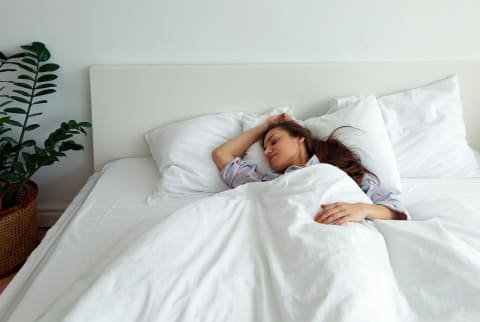Advertisement
Why Women Have Different Sleep Needs Than Men + What To Do About It


As any woman whose been kept awake by the steady snooze of a male bed partner can attest, sleep differences between the sexes are all too real. Science confirms that women and men do have vastly different sleep needs and challenges, a divergence that begins as early as puberty1.
Why women have different sleep needs than men
Last fall, mbg's vice president of scientific affairs, Ashley Jordan Ferira, Ph.D., RDN, unpacked some reasons that women may have a harder time sleeping than men on an Instagram Live Q&A. "Sleep is a good indication of hormonal changes," Ferira noted, meaning that transitions that affect female hormones (think menstruation, pregnancy, premenopause, menopause, and postmenopause) are bound to affect sleep in one way or another.
Beyond affecting hormones like progesterone, luteinizing hormone, and prolactin, these phases can also come with uncomfortable side effects that keep us up at night. Combine that with the fact that women are more likely to report having higher stress levels than men, and you have a recipe for all kinds of sleep disturbances.
Ferira pointed out that women tend to take longer to fall asleep2 and wake up more throughout the night3 than men do, for example. And while they do tend to get a bit more4 deep, restorative slow-wave sleep than men, women may not reap all the benefits of it because of overactive minds5.
"Even while [women] are sleeping more deeply, certain parts of their brain are showing more activity during sleep," clinical psychologist Wendy M. Troxel, Ph.D., previously explained to mbg. "That corresponds with what women often say: 'Yes, I may be sleeping, but my mind is always active.'"
What to do about it
All of these factors make healthy wind-down rituals and sleep routines even more crucial for women—especially those who are under a lot of stress or in a period of hormonal flux.
Adding a science-backed sleep supplement, like mbg's sleep support+, to your routine may also prove helpful.* This supplement combines magnesium bisglycinate, jujube, and PharmaGABA® for a relaxing sleep aid that is safe to take nightly (though those who are pregnant or breastfeeding should check in with their doctor before starting with any new supplement).*
While sleep support+ has helped hundreds of people achieve better sleep, it gets particularly rave reviews from women using it to fall asleep faster, stay asleep longer, or wake up feeling more refreshed.*
"I have had problems sleeping for years. So many sleep aids did not work for me or left me groggy in the morning. Finally found this product that relaxes my mind so I can drift off and sleep peacefully most of the night,"* writes reviewer Nancy P.
Others, like reviewer Prudence T., note that the product helps them drift back to sleep easier after pesky mid-night wakeups. "Waking at 3 a.m. still happens, but I'm able to fall back to sleep more often, usually fairly quickly,"* Prudence writes.
Reviewer Jennifer N. also finds that the supplement helps her get back to bed fast—without the addition of any (potentially problematic) hormones like melatonin, writing, "Sleep support works for me. I was skeptical but it really works! I have noticed since taking it that most nights I am able to go back to sleep after I wake up. I'm also happy to find something without melatonin in it."*
The takeaway
Differences in hormones, stress levels, and sleep architecture can make it more difficult for women to achieve a high-quality snooze than men. When combined with a healthy wind-down routine, sleep support+ is one supplement that can help.* Learn more about the product here.
